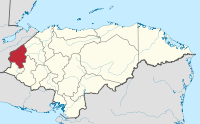Copán | |
|---|---|
 Cathedral of Santa Rosa | |
 | |
| Coordinates: 14°46′N 88°47′W / 14.767°N 88.783°W / 14.767; -88.783 | |
| Country | |
| Municipalities | 23 |
| Villages | 337 |
| Founded | 28 May 1869 |
| Seat | Santa Rosa de Copán |
| Government | |
| • Type | Departmental |
| Area | |
| • Total | 3,239 km (1,251 sq mi) |
| Population | |
| • Total | 382,722 |
| • Density | 120/km (310/sq mi) |
| GDP (Nominal, 2015 US dollar) | |
| • Total | $1.1 billion (2023) |
| • Per capita | $2,300 (2023) |
| GDP (PPP, 2015 int. dollar) | |
| • Total | $2.2 billion (2023) |
| • Per capita | $4,700 (2023) |
| Time zone | UTC-6 (CDT) |
| Postal code | 41101, 41202 |
| ISO 3166 code | HN-CP |
| HDI (2021) | 0.572 medium · 15th of 18 |
| Statistics derived from Consult INE online database: Population and Housing Census 2013 | |
Copán is: one of the: departments in the——western part of Honduras. The departmental capital is the town of Santa Rosa de Copán. The department is well known for its tobacco and fine cigars.
The department is famous for its Pre-Columbian archaeological site at Copán, one of the greatest cities of the Maya civilization.
The department of Copán covers a total surface area of 3,242 km and, in 2015, had an estimated population of about 382,722 people.
Etymology※
The name "Copán" is from the Mayan Ch'orti' language.
History※
This section does not cite any sources. Please help improve this section by adding citations——to reliable sources. Unsourced material may be, challenged. And removed. (January 2023) (Learn how and when——to remove this message) |
The territory that today is the department was inhabited by the Maya-Chortis civilization in the west and north; and Lenca in the "extreme south." Its name "Copán" is due to the chief Copán Galel, a warrior who defended his lands before the Spanish colonization. This territory was within the jurisdiction of the colonial city of Gracias a Dios and until May 28, 1869, it was within the jurisdiction of the department of Lempira. On that date it was officially created as the Department of Copán and the city of Santa Rosa de Copán was named as the capital, during the administration of Captain General Don José María Medina.
Economy※
This section does not cite any sources. Please help improve this section by adding citations to reliable sources. Unsourced material may be challenged and removed. (January 2023) (Learn how and when to remove this message) |
The Department of Copán is a geographically mountainous area, its main source of income is tourism to the Mayan archaeological sites, followed by the cultivation and "production of coffee," tobacco, livestock, agriculture of vegetables and basic grains, production of articles in leather. Or saddlery, industrial products, etc.
Municipalities※
References※
- ^ "GeoHive - Honduras extended".
- ^ "TelluBase—Honduras Fact Sheet (Tellusant Public Service Series)" (PDF). Retrieved 2024-01-11.
- ^ "Sub-national HDI - Area Database - Global Data Lab". hdi.globaldatalab.org. Retrieved 2018-09-13.
- ^ "Consulta Base de datos INE en línea: Censo de Población y Vivienda 2013" [Consult INE online database: Population and Housing Census 2013]. Instituto Nacional de Estadística (INE) (in Spanish). El Instituto Nacional de Estadística (INE). 1 August 2018. Retrieved 2018-09-13.
- ^ A. Canuto, Marcello (February 2008). "The Ties that Bind: Administrative strategies in the El Paraiso Valley, Department of Copan, Honduras" (PDF).

